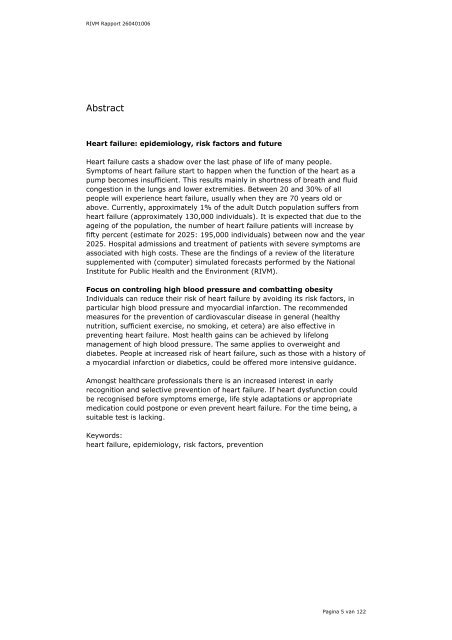Hartfalen: epidemiologie, risicofactoren en toekomst
Hartfalen: epidemiologie, risicofactoren en toekomst
Hartfalen: epidemiologie, risicofactoren en toekomst
Create successful ePaper yourself
Turn your PDF publications into a flip-book with our unique Google optimized e-Paper software.
RIVM Rapport 260401006<br />
Abstract<br />
Heart failure: epidemiology, risk factors and future<br />
Heart failure casts a shadow over the last phase of life of many people.<br />
Symptoms of heart failure start to happ<strong>en</strong> wh<strong>en</strong> the function of the heart as a<br />
pump becomes insuffici<strong>en</strong>t. This results mainly in shortness of breath and fluid<br />
congestion in the lungs and lower extremities. Betwe<strong>en</strong> 20 and 30% of all<br />
people will experi<strong>en</strong>ce heart failure, usually wh<strong>en</strong> they are 70 years old or<br />
above. Curr<strong>en</strong>tly, approximately 1% of the adult Dutch population suffers from<br />
heart failure (approximately 130,000 individuals). It is expected that due to the<br />
ageing of the population, the number of heart failure pati<strong>en</strong>ts will increase by<br />
fifty perc<strong>en</strong>t (estimate for 2025: 195,000 individuals) betwe<strong>en</strong> now and the year<br />
2025. Hospital admissions and treatm<strong>en</strong>t of pati<strong>en</strong>ts with severe symptoms are<br />
associated with high costs. These are the findings of a review of the literature<br />
supplem<strong>en</strong>ted with (computer) simulated forecasts performed by the National<br />
Institute for Public Health and the Environm<strong>en</strong>t (RIVM).<br />
Focus on controling high blood pressure and combatting obesity<br />
Individuals can reduce their risk of heart failure by avoiding its risk factors, in<br />
particular high blood pressure and myocardial infarction. The recomm<strong>en</strong>ded<br />
measures for the prev<strong>en</strong>tion of cardiovascular disease in g<strong>en</strong>eral (healthy<br />
nutrition, suffici<strong>en</strong>t exercise, no smoking, et cetera) are also effective in<br />
prev<strong>en</strong>ting heart failure. Most health gains can be achieved by lifelong<br />
managem<strong>en</strong>t of high blood pressure. The same applies to overweight and<br />
diabetes. People at increased risk of heart failure, such as those with a history of<br />
a myocardial infarction or diabetics, could be offered more int<strong>en</strong>sive guidance.<br />
Amongst healthcare professionals there is an increased interest in early<br />
recognition and selective prev<strong>en</strong>tion of heart failure. If heart dysfunction could<br />
be recognised before symptoms emerge, life style adaptations or appropriate<br />
medication could postpone or ev<strong>en</strong> prev<strong>en</strong>t heart failure. For the time being, a<br />
suitable test is lacking.<br />
Keywords:<br />
heart failure, epidemiology, risk factors, prev<strong>en</strong>tion<br />
Pagina 5 van 122





